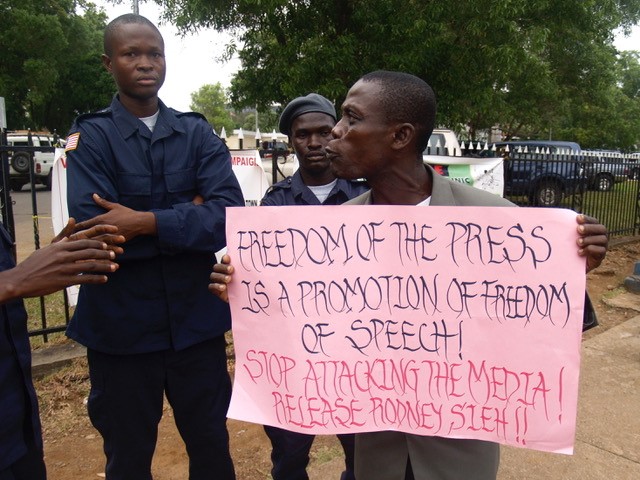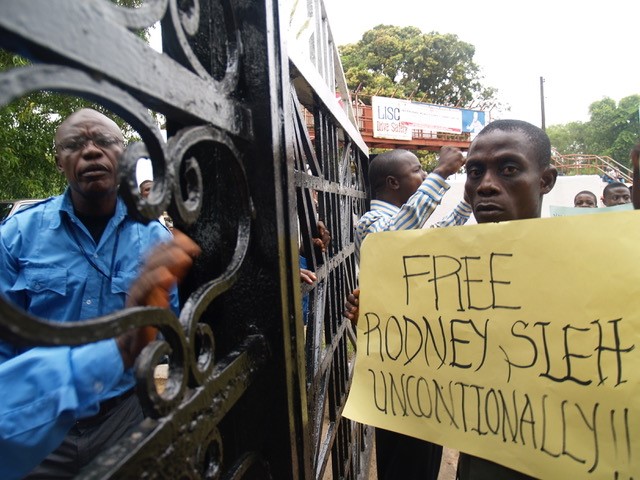It’s late at night in Monrovia and Rodney Sieh is still working. Earlier in the day, the Liberian Supreme Court had handed down a controversial ruling about the country’s upcoming general election. Deadlines were looming and Sieh’s newspaper, Front Page Africa, had a big story to tell.

The fact that Sieh and his staff could report on this big story – or any story – is a tribute to their tenacious dedication to pursuing truth in a country with a history of civil war, government corruption and human rights violations. It’s also a tribute to the work done by the Canadian-based charity Journalists for Human Rights (JHR).
The mission of JHR is to train journalists so they can use traditional reporting skills to cover human rights and other important issues in their communities. Sieh is quick to credit JHR for helping develop the editorial staff at Front Page Africa, which he first started in 2005 as a digital publication while working in the United States. He then began producing a printed newspaper in 2010 after he came back to Liberia.
“When I returned from the United States to come back to Liberia, one of the biggest challenges we had was capacity building,” says Sieh. “We didn’t have a lot of trained reporters and trained editors. So it was a big gap that needed to be filled.”
Aaron Leaf was one of the first JHR trainers to go to Liberia to work with Front Page Africa reporters.
“A lot of the journalists were on a very basic level,” says Leaf.
“It’s a condition of not having had a functioning school system during the war. You had really ambitious young journalists, but they didn’t have proper writing or reporting backgrounds. I came in with all these high-minded ideas of human rights journalism, but I really started with the basics. It was almost Journalism 101 in the Liberian context.”
But once Front Page Africa reporters learned the basics, the human rights journalism soon emerged. One of the first people Leaf worked with was Mae Azango, now an internationally renowned journalist whose reporting on female genital mutilation brought global attention to the cruel ritual, eventually forcing the government to act.
Sieh said JHR trainers like Leaf “brought to the table a new dimension for reporters, making sure their stories were not just believable, but taking them on field trips to different parts of the country and getting them to tell stories that you wouldn’t ordinarily hear about Liberia.”
Stories about prostitution, striking mineral workers, poverty – stories that had never been covered by other Liberian publications whose staff regularly accepted bribes from politicians.
Front Page Africa did such an effective job of exposing human rights violations and corruption that Sieh was sent to prison in 2013 on a trumped-up libel charge. The newspaper was shut down and Sieh was ordered to pay the equivalent of $1.5 million.
The court said if he couldn’t pay the fine – and he couldn’t – then the sentence would be converted to an appropriate amount of time. The ruling: 5,000 years. International outcry by human rights organizations, including JHR, forced the Liberian government to release Sieh after five months.

Front Page Africa never stopped publishing while Sieh was in prison and today it’s providing a wide range of coverage for the citizens of Liberia and people around the world who want reliable information about the country. Sieh says JHR’s mentoring has had a lasting impression in his newsroom and, therefore, on Liberia.
“Most journalism training organizations, they come and do workshops and then they go back to where they come from. But JHR’s projects, they stay a long time. They work with the reporters, they get to know them, they become friends, they become mentors. That’s something you can’t buy. It’s priceless.”
Leaf has since gone on to be managing editor at Okayafrica, a New York-based digital publication that focuses on African culture, politics and music. He is critical of many aid programs in Africa, but says the work of JHR is different because it teaches sustainable skills.
“I’ve seen a lot of terrible, terrible charity and NGO work first-hand – some of the worst stuff imaginable,” he says.
“One of the ways people describe bad aid is well-meaning charities or organizations go into African countries, build big infrastructure things, and then leave without any of the framework around to keep those projects running, or they were never built right in the first place.”
Journalists for Human Rights “has drilled down very specifically on where they can make an impact. And they do make an impact. They have very targeted, specific interventions where they’re needed.”
Leaf talks about the “multiplier effects” of JHR’s work.
“Once you have someone in Liberia who is really well-versed in reporting on corruption, then you have a lot more awareness and action on corruption in that country. There’s a very clear cause and effect – train someone and then they go and do something for the greater good.”
Scott White is Editor of The Conversation Canada.
This post is a result of a partnership between Globalnews.ca and Journalists for Human Rights and is sponsored by:










Comments